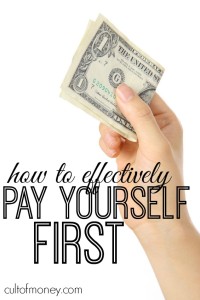 I was balancing my checkbook last weekend and after paying the bills and the babysitter I was left with $82.56. Since I’ve been making a lot more money over the past few months you’d think there would be a lot more money sitting in my checking account.
I was balancing my checkbook last weekend and after paying the bills and the babysitter I was left with $82.56. Since I’ve been making a lot more money over the past few months you’d think there would be a lot more money sitting in my checking account.
But the thing is, I haven’t changed my system at all.
The “pay yourself first” principle is something that I’ve managed to stick with and has gone extremely well.
I spend the same amount of money regardless of how much I earn. I eat the exact same things. Go (or don’t go) to the exact same places. And when the checking account gets down to $82.56 it means it’s time to get a little creative.
Here’s how I am able to save money each and every month.
I Pretend Like I’m Broke
If you were hoping for some magic secret that made this strategy a little easier I’m sorry because I don’t have it.
I put a certain amount of my income into checking each week (Jamie’s check goes in there too) I pay the bills, do my grocery shopping, and if there’s money left over for something I want to do that’s great. But often times there just isn’t and that’s fine too.
When that set amount of money is gone it’s gone.
And really it’s not bad pretending like you’re broke when you don’t spend much money anyway. Especially considering that most of my preferred activities are free or super cheap. (Fishing, mushroom hunting, playing catch with the girls, visiting family, babysitting my niece and nephew, etc.)
I Save Certain Income Streams
The beautiful thing about working online is that my income comes from many different places.
One strategy that I’ve been using for a long time is to save certain income streams. This has worked out exceptionally well because the income streams that I save have rapidly grown and the income streams that I spend seem to stay right around the same every month.
I Have Savings Direct Deposited
Of the income streams that I do save I have them directly deposited into my savings account. Then I log into my savings account a couple times a month just to make sure everything has made it in there alright. (Which it always does!)
With this strategy I never have to touch the money or move it around. I don’t see it and I simply pretend like it’s not even there.
Do I Always Stick With This?
There have been two occasions that I can think of where I had to use some of my dedicated savings. The first was when I forget about the six months insurance premium coming due and the second was when we had a bunch of physical therapy bills come in that I thought would’ve been covered by insurance.
It seemed to make a lot more sense to just go ahead and delay that savings rather than pull the money from the emergency fund just to put it right back.
How to Get Started Paying Yourself First
If you’re new to the concept of paying yourself first or are just unable to make it work here are the strategies that really helped me get started.
Have a Goal
You need to have a goal that means something to you to make this work. For me this has been buying a house and just overall financial stability and eventually financial freedom.
You’ll be so much less stressed if you can build yourself a nice cash buffer.
Start Small
Start with any amount of money you can – even if that’s just five dollars per week. If you can have that amount automatically taken from your check into your savings then definitely go that route!
After getting divorced there was no amount that was too small for me to save. I’d stash away $8 here, $4 there, and just anything that I could afford to spare.
Use Specific Income Streams
If you seriously can’t afford to even stash an extra dollar per week away then you need to create yourself an extra income stream. In a year from now you’ll be so glad that you did!
Start trying stuff out and see what sticks. It might take a lot of trial and error (but eventually you’ll find a good second source of income. Save all of it!
Check out: Ways to make an extra $500 per month.
Be Aware of Lifestyle Inflation
The biggest tip I can give you is to be aware of lifestyle inflation. If you can comfortably live off of $3,000 per month then never put more than $3,000 per month into your checking. This will keep your from going on a spending rampage. (Because sometimes that’s tempting to do!)
That’s not to say you can NEVER increase your spending it just needs to be a well thought out process.
Money is a tool to help you create the life you want to live. That’s it. Keep in that mind and it will help you stay on track.

Alexa Mason is a freelance writer and wanna be internet entrepreneur. She is also a newly single mom to two beautiful little girls. She chronicles her journey as a single mom trying to make it big at www.singlemomsincome.com.
